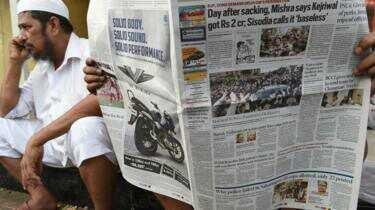The story is hardly ever reported by the Indian media

India is languishing to the bottom of the rankings for press freedom
This is a potential scandal that claims to strike at the main pillar of Indian democracy - press freedom - but hardly reported in Indian media.
There is a simple reason for this: this alleged scandal involves many of the most powerful media institutions in the country.
The sting operation by a news organization called Cobrapost claims to have revealed a profound bias against the ruling Bharatiya Janata Party (BJP) in many of India's leading media groups, as well as a willingness among some of the country's most senior executives and journalists. to take money in return for pushing the political agenda.
Cobrapost, a small but controversial outlet known as undercover, describes itself as a non-profit news organization that believes too much journalism in India has been "underestimated". It has been dubbed the story "Operation 136" - the figure is a reference to India's ranking in the 2017 World Press Freedom Index.
Their website says its footage shows that some of the country's leading news organizations are willing "not only to cause communal disharmony among citizens, but also tilting election results in favor of certain parties" - and all in return for cash.
This disguised disguise is so unreliable. Records can be easily taken out of context or edited to change the meaning of a conversation or misrepresent its true nature.
An undercover journalist from Cobrapost, Pushp Sharma, said he approached more than 25 leading media organizations in India, offering them all a similar deal.
He claimed to represent a wealthy ashram - a Hindu monastery - which, he said, is willing to pay large sums of money ahead of next year's general election in an effort to ensure the BJP, the Hindu nationalist party, remains in power. .
Mr Sharma said he outlined a three-step strategy of his paymasters wanting to bankroll.
First, he proposes media organizations promoting what he describes as "soft Hindutva" - the idea that Hindu beliefs and values are the ideologies that define India. He suggested this could involve promoting the words of Lord Krishna or retelling the stories of the Bhagvad Gita, an epic poem that is one of the sacred texts of Hinduism.
The next phase will involve attacks on BJP's political rivals, especially Rahul Gandhi, leader of the main opposition Congress Party.
Finally, his plan was to promote incendiary speeches from some Hindutva hard-line supporters, including divisive Hindu radical figures.
The idea of this stage of operation, Mr Sharma explains to some executives, is to break up voters in the hope that BJP will benefit in the ballot box.
'Video viral and jingle'
Among media groups, Cobrapost says his approach is a giant like Bennett Coleman, a media empire with The Times of India - the largest English-language newspaper sold not only in India but in the world.
It also targets The New Indian Express, other major English newspapers, and India Today Group, which owns one of the most popular television news channels in the country.
Hindi-language newspapers and regional media groups were also approached.
According to Cobrapost, all but two of the more than two dozen groups that met with said they were willing to consider the plan.
Videos from meetings posted on the Cobrapost website show media executives, editors and journalists discussing how they can accommodate their proposals.

Cobrapost has made several serious allegations about some of India's most powerful media organizations
Different organizations come with a variety of suggestions, from unpublished "advertorials" publications, to paid news and special features.
Some said they would form a "special team" to push the ashram agenda. There's talk about making viral videos, jingles, quizzes and shows.
Cobrapost has made some potentially very serious allegations about some of the world's most powerful media organizations.
In most democracies, such a claim would produce a major national scandal with headlines and public outcry.
But, here in India, only a few online media organizations - including Wire, Scroll, and The Print - have given extensive coverage of the story.
'Sting backwards'
Several large media groups targeted in the sting have responded to Cobrapost's claims, however.
They deny making a mistake and say that an undercover tape has been edited to misrepresent the true nature of the meeting.
The Times of India, for example, said it was "a case of content creation and forgery" and said there was no media organization called Cobrapost "agreeing illegal or immoral activities and no signed contracts".
Video Cobrapost appeared to show Vineet Jain, managing director of Bennett Coleman, publisher of the Times of India, haggling over how many groups would need to consider the proposal. Mr Jain said he wanted $ 150mn (£ 112mn) but eventually settled halfway.
There is also a discussion of how payments can be made in cash, perhaps to avoid paying taxes.
Bennett Coleman has since rejected any suggestion of dishonesty. In fact, an article in the Times of India explains that Cobrapost is a victim of what newspapers call "reverse sting".
He said "senior officer" Bennett Coleman is well aware that Sharma is an impostor and deliberately follows his proposal in an attempt to "trick the deceiver and find his true intentions."

Cobrapost's claim raises doubts over media independence in India
The Indian Today group also denied wrongdoing. In a statement, it was said that the company's managers would not do anything unethical, and that any ad dividing the country on a religious or caste line would not be accepted or broadcast on its channel.
Meanwhile New Indian Express says that there is no editorial problem for newspapers because the meeting was between undercover reporters and advertising executives and the discussion was only about the possibility of an advertising campaign.
He also said he would never accept ads that encourage disharmony communal and that executives explain that any advertisement needs to be legally examined.
There is no question that the Cobrapost allegations need to be treated with healthy skeptics. But there is also no doubt that they raise uneasy doubts over media independence in India, especially when this year is far from elections.
That the greatest democracy in the world languishes to the bottom of the rankings for press freedom has become a matter of national shame.
If proven, these accusations will no doubt see India slipping further down the table.
The main title on the online news site, Scroll, captures the challenges facing the country.
"Cobrapost exposure shows Indian media is sinking", it runs. "Now we can fight or drown."